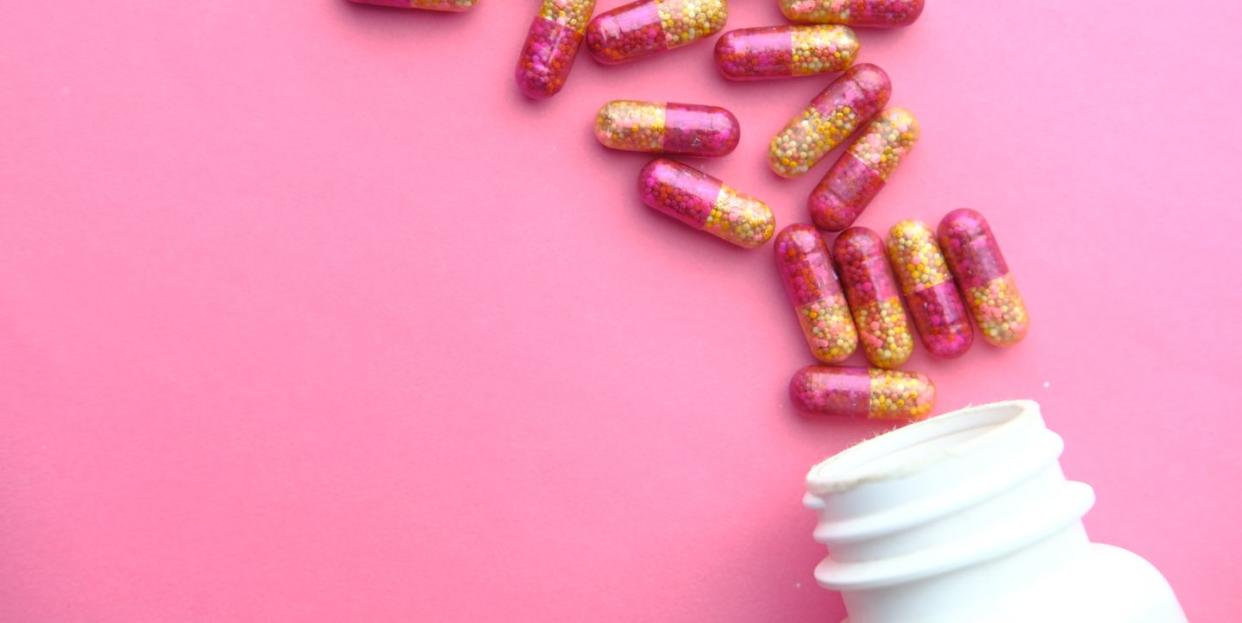Are These Vitamins the Secret to Clear Skin?

You are what you eat, and that old adage couldn’t be truer than when it comes to your skin. Scientists and doctors have concluded that nutrition likely plays a huge role in skin health, and that vitamins for acne shouldn’t be overlooked.
“While there are many clinical dermatological treatments for acne available, there are other diet and nutritional interventions that can help make a difference for those people that suffer with acne,” explains Maggie Luther, ND, medical director and formulator at Care/Of.
It's important to note that while adding specific foods and vitamins for acne may help you fight your flareups, there’s also evidence suggesting that specific foods might be causing your acne.
“There is mounting data showing that a carbohydrate-rich diet may be associated with acne flare-ups, as the high sugar load promotes inflammation throughout the body, including the skin, leading to pimples,” says Joshua Zeichner, MD, director of cosmetic and clinical research in dermatology at Mount Sinai Hospital in New York. “Also, cows milk, particularly skim milk, has been associated with acne flares, but interestingly, yogurt and cheese have not been associated.”
Experts agree you should pay attention to the foods you’re consuming if you suffer from breakouts, but you might also want to consider adding vitamins and supplements into your daily routine for a healthy-skin boost (just check with your doctor before starting any sort of supplement). Here are the six vitamins and nutrients that may help you achieve clearer skin:
1. Zinc
Inflammation in the skin is one of the main causes of breakouts (as well as a host of other skin issues), and according to Dr. Zeichner, zinc has anti-inflammatory properties and has been shown to help improve acne. Zinc was also recently noted in a study published in Dermatologic Therapy as “a promising alternative to other acne treatments owing to its low cost, efficacy, and lack of systemic side effects,” explains Dr. Luther.
2. Omega-3 and Omega-6 Fatty Acids
Acne-prone skin has been linked to low intake of linoleic acid, an omega-6 fatty acid, says Dr. Zeichner. In fact, a recent placebo-controlled study looked into how omega-3 fatty acid and linoleic acid (an omega-6) supplements affected skin.
“After 10 weeks, in both the omega-3 group and in the GLA [gamma-linolenic acid] group, supplementation resulted in a significant reduction in both inflammatory and non-inflammatory acne lesions,” says Dr. Luther.
Make sure you're not making these mistakes when taking vitamins:
3. Vitamin E
Topical vitamin E has long been a skincare hero—it can fade dark spots, calm inflammation, and moisturize—but ingesting the vitamin (as a supplement—please don't drink your serum!) is also important for acne-prone skin. "Low levels of vitamin E in the blood has been correlated with the severity of acne," says Dr. Luther. “Those patients with higher levels of this antioxidant had lower severity of acne.”
4. Probiotics & Prebiotics
In recent years, probiotics (live microorganisms) and prebiotics (these act like food for good bacteria) have become a major health trend—and for good reason.
“Probiotics and the body’s existing natural beneficial bacteria can help neutralize oxidative stress, modulate inflammation, and even support a healthy mood," says Dr. Luther. Another benefit: "Studies show that all of these things can also help defend against inflammatory forms of acne."
5. Vitamin A
“Vitamin A derivatives, like retinol, are commonly used to treat acne because they reduce inflammation in the skin and prevent skin cells from sticking together and clogging pores,” says Dr. Zeichner. “I caution patients against ingesting too much Vitamin A, though, as it can cause extreme dryness of the skin, make you sensitive to the sun, interfere with your vision, and may even affect your liver.”
Topical vitamin A has long been studied for its skin-clearing (and anti-aging) benefits, so in this case it's best to stick with serums and creams, rather than supplements.
6. Astaxanthin
Antioxidants (including astaxanthin) play such an important role for so many areas of the body, the skin included. “Astaxanthin, which is produced by microalgae and often found as a supplement, has been well studied for years in regards to providing the skin with numerous benefits,” explains Dr. Luther.
“While acne is not quite yet in that line-up, antioxidants have been associated with improved overall skin health, including a reduction in fine lines, sun spots, and inflammation,” she adds. Given that antioxidants benefit skin, astaxanthin may be a good product to support overall skin health, allowing for the skin to be able to better heal in those with acne.
You Might Also Like

